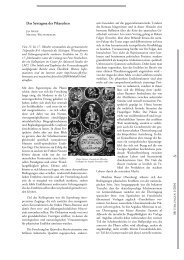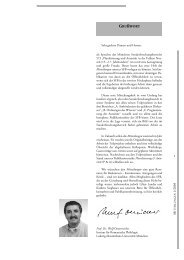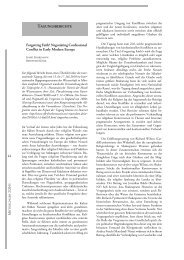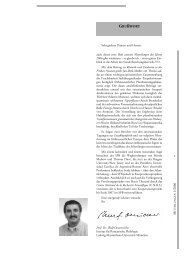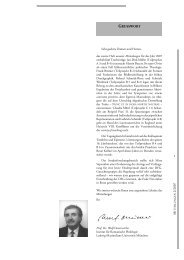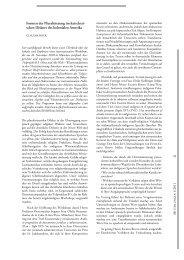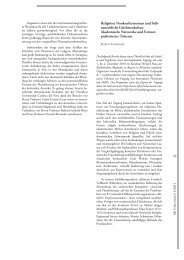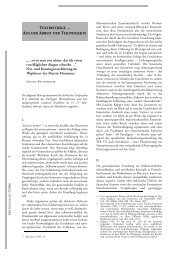Mitteilungen 2-2011_final.fm - SFB 573 - Ludwig-Maximilians ...
Mitteilungen 2-2011_final.fm - SFB 573 - Ludwig-Maximilians ...
Mitteilungen 2-2011_final.fm - SFB 573 - Ludwig-Maximilians ...
Erfolgreiche ePaper selbst erstellen
Machen Sie aus Ihren PDF Publikationen ein blätterbares Flipbook mit unserer einzigartigen Google optimierten e-Paper Software.
18<br />
MITTEILUNGEN 2/<strong>2011</strong><br />
genres, from chronicle histories to history plays and<br />
metahistorical tracts. In what follows I explore the complex<br />
relations between remembering and forgetting at<br />
work in early modern historiographical practice on the<br />
page as well as on the stage. At least in regard to prose<br />
histories, this relation usually manifests itself as a tension<br />
between an anxious denial of oblivion and forgetting<br />
as a constitutive force of memory. This tension<br />
can be taken as symptomatic of early modern historiographical<br />
practice. While the interplay<br />
of remembering and forgetting<br />
shapes cultural memory in<br />
any epoch, it accrues a specific dynamic<br />
and, what is more, a specific<br />
virulence in Tudor and Stuart England.<br />
This is due to the impact of<br />
the Reformation, the shift toward a<br />
modern nation state as well as to<br />
the rise of print culture. 1 While the<br />
first two developments appropriated<br />
historiography for their own<br />
political uses, 2 the latter changed<br />
the very conditions under which<br />
historical memory operated. Under<br />
the influence of these epochal transformations,<br />
historiographical practice<br />
changed considerably from the<br />
beginning of the sixteenth century<br />
on. Part of this change was an increasing<br />
awareness of the social and<br />
cultural functions of historiography,<br />
an awareness that was articulated<br />
and negotiated most explicitly<br />
in the paratextual space of prefaces,<br />
dedications and letters to the<br />
readers as well as in the newly emergent<br />
genre of meta-historical commentary.<br />
These reflections shed<br />
light on how forgetting constituted an integral part of<br />
early modern historiographical practice.<br />
Edward Hall’s The Union of the Two Noble Houses<br />
of Lancaster and York (1550), another source for Shakespeare’s<br />
play, provides a particularly apt starting point<br />
for our topic, since it begins with the very word »Oblivion«,<br />
highlighted by a beautifully ornate capital (see<br />
fig. 2). Hall’s dedication to Prince Edward presents a<br />
lengthy, detailed meditation on the relation between<br />
remembering and forgetting as well as on the media of<br />
historiography and its social role. The first sentence already<br />
gives us a good idea of this:<br />
Obliuion the cancard enemye to Fame and renoune<br />
the sucking serpēt of aunciēt memory, the dedly<br />
darte to the glory of princes, and the defacer of all<br />
Figure 2<br />
Edward Hall: ›The Union of the Two Noble Houses‹ (1550),<br />
dedication.<br />
conquestes and notable actes, so much bare rule in<br />
the firste and secōde age of the worlde, that nothing<br />
was set out to mennes knowledge either how y e<br />
world was made either howe man and beastes wer<br />
created, or how y e worlde was destroied by water, til<br />
father Moses had by deuine inspiraciōn in the third<br />
age, inuented letters, the treasure of memorie, and<br />
set furth true notable bokes, to the greate comfort of<br />
all people liuing at this daie. 3<br />
From the start, the text sets up an<br />
opposition between oblivion and<br />
memory that is aligned with the<br />
distinction between oral report and<br />
written record. This medial difference<br />
is inscribed into a narrative of<br />
progress from the people of »the<br />
first and second age of the worlde«,<br />
whose origins and identity are lost<br />
to oblivion because of their incapability<br />
to record history, on to<br />
modern civilizations whose social<br />
hierarchy and moral values are preserved<br />
in and by written memory.<br />
Tracing the invention of letters,<br />
»the treasure of memory« to its origin<br />
in Judaeo-Christian tradition,<br />
Hall invests it – and his account –<br />
with cultural authority.<br />
More important than the origins<br />
of writing and of writing<br />
history, however, are the social<br />
functions attributed to it. In suppressing<br />
»that dedly beast Oblivion«,<br />
Hall argues, historiography<br />
does no less than uphold social hierarchies<br />
and moral values: »For<br />
what diversitie is between a noble<br />
prince and a poore begger, ye a reasonable man and a<br />
brute beast, if after their death there be left of them no<br />
remembrance or token.« 4 Remembrance of the dead is<br />
presented here as crucial to the society of the living. The<br />
wealth of funerary rituals and rites of remembrance<br />
inherited from the Middle Ages testifies to this importance.<br />
When the Reformation abolished many of<br />
these practices of ritual remembrance, it left a vacuum<br />
which to some extent was filled by historiography. The<br />
Reformation may indeed have prompted an increasing<br />
sense of history by severing the continuity between<br />
England’s past and present, thus rendering the past as<br />
radically other. 5 Elizabeth Mazzola even suggests that<br />
»Protestant iconoclasm must also be viewed as an historiographical<br />
practice, since rejecting Purgatory inspired<br />
new paradigms for human history and new limits for<br />
1. Pfister 2006.<br />
2. For a wide range of examples, see the excellent collection edited<br />
by Kewes 2006.<br />
3. Hall 1550, sig. A.ii r .<br />
4. Ibid., sig. A.iii r .<br />
5. Goodland 2005, 3.



